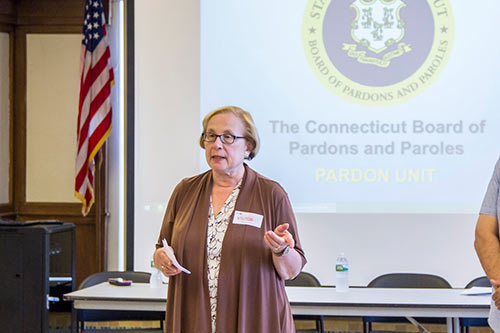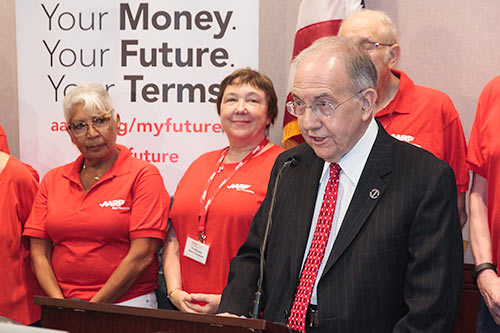Gerratana and Sanchez Host Pardon Workshop in New Britain
Resources are available for Connecticut residents seeking pardons to expand their employment opportunities

NEW BRITAIN, CT—Senator Terry Gerratana (D-New Britain) and Representative Bobby Sanchez (D-New Britain) hosted an informational session this week with Connecticut Legal Services and the Board of Pardons and Paroles. Dozens of area residents attended to seek information on the policies and procedures for obtaining a pardon.
“Past mistakes should not haunt a person for their entire lives and should not prevent them from finding work to support themselves and their families, “said Senator Gerratana. “Increasing employment opportunities is the single best way to reduce the risk of recidivism, but a past criminal record can make it nearly impossible to find a job. We need to give low-risk individuals the opportunity to move past their mistakes and build a better future for themselves and their loved ones.”
“I am grateful to CT Legal Services and the Board of Pardons and Paroles for their willingness to come and meet with New Britain area residents who have concerns about the application process for pardons,” said Representative Sanchez. “Many individuals with misdemeanor convictions and felony convictions don’t know how the process works and what to expect during such hearings once they become eligible. I am pleased we were able to provide this valuable information to our constituents and look forward to continue working for my community.”
Connecticut residents may be eligible for a pardon depending on the time that has passed since their most recent conviction. Applicants may only be eligible for a pardon if they are not on parole or probation, and have no pending charges or open cases in Connecticut or any other jurisdiction. There are two kinds of pardons available:
- An “Absolute Pardon” (also known as an expungement), erases an individual’s criminal record. Persons who receive an absolute pardon can say on a job application saying that they have never been convicted of a crime. Absolute pardons can be applied for three years after the disposition of a misdemeanor conviction or five years after the date of the disposition of a felony conviction.
- “Certificates of Employability” do not erase an individual’s criminal record, but can help with getting a job. These Certificates make it illegal for an employer to deny employment based on a job applicant’s criminal record alone. Certificates of Employability also indicate that a person is suitable to hold certain types of licenses. A Certificate of Employability can be applied for 90 days after the probationary period following a completed criminal sentence, as long as the individual has not been arrested during that period. Certificates can also be applied for by individuals under court supervision of the Department of Correction’s Parole and Community Service Division after they have completed 90 days of supervision.
Anyone interested in more information on pardons and Certificates of Employability can contact Connecticut Legal Services or the Connecticut Board of Pardons and Paroles. Connecticut legal services can be reached by phone at 860-344-0447 or by email at povertylaw@connlegalservices.org. The Board of Pardons and Paroles can be reached by phone at 203-805-6605 or by email at ct.bpp@ct.gov.
